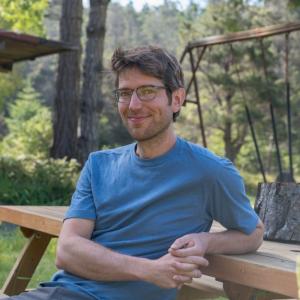Notes from the Director, Spring 2021

William Ratcliff, Co-Director of the Interdisciplinary Graduate Program in Quantitative Biosciences
Light at the end of the tunnel: celebrating graduations and community
The COVID-19 pandemic has led to acute changes in how we teach, learn, and explore living systems. Yet, the availability of safe and effective vaccines and the decline of case rates in most US states (including Georgia) are providing hope that pandemic impacts may be ebbing. After a year-long viral testing program and a Spring vaccination drive, Georgia Tech is gearing up for a normal residential college experience this fall. This summer, research labs are reopening at or near full strength, and mentors, students, colleagues and friends who have spent much of the last year chatting through computers will have the opportunity to interact regularly in person. This is all very welcome news, and I deeply appreciate the hard work and sacrifices made by so many to make this happen.
In the spirit of togetherness, we held our first annual 'QBioS Summer Share' on June 4th. This was an opportunity for our community to share science, food, and comradery, and will consist of talks by graduate student award winners, faculty, and alumni, followed by an outdoor lunch and social.
Despite the challenges of the past year, it is important to mark major accomplishments of the QBioS community.
This May, Profs. Weitz and Gumbart and the Fall 2020 QBioS cohort organized our program’s 5th annual hands-on modeling workshop, this time on the theme of epidemics. This workshop included more than 60 participants from around the world and provided instruction for how to build dynamic models used to track epidemics like COVID-19, with plenary lectures from Profs. Sarah Cobey (U of Chicago) and Sam Scarpino (Northeastern University), virtual instruction led by QBioS PhD students using Python, Matlab, and R, and lessons on how to build an interactive epidemic modeling dashboard developed by partners at the Applied Bioinformatics Laboratory.
Our first cohort, who started back in 2016, have recently graduated or are on track to graduate later this year. Dr. Lijang Long studied speciation in both cichlid fish and nematodes, developing novel computational approaches to unite behavioral, genetic and neurobiological mechanisms. He is now working as a data analyst for Home Depot. Dr. Alexander Lee examined the biophysics of animal digestion and is now following his long-held desire to teach mathematics in high school as a part of Project NURTURE. Dr. Alireza Zamani-Dahaj studied the evolutionary and biophysical origin of multicellular bodies, and is now working as a Senior Scientist at the startup GenoTwin. Dr. Guanlin Li developed theory exploring how phage-antibiotic cocktails could be used to control bacterial infections and will soon start working as a quantitative researcher at the Chicago Trading Company.
We are also pleased to recognize the outstanding scholarship and community development/outreach work of several QBioS students, with the inaugural QBioS Awards. These come with a cash prize and invitation to speak at the QBioS Summer Share event.
Rogelio Rodriguez Gonzales won the Best Paper in Ecology and Evolution award for his paper “Quantitative Models of Phage-Antibiotic Combination Therapy”, published in mSystems. Danny Lauer and Rozenn Pineau took the Distinguished Paper in Ecology and Evolution award for their paper “Plant biomes demonstrate that landscape resilience today is the lowest it has been since end-Pleistocene megafaunal extinctions”, published in Global Change Biology.
Joy Putney won the Best Paper in Organismal Behavior and Physiology award for her paper “Precise timing is ubiquitous, consistent, and coordinated across a comprehensive, spike-resolved flight motor program”, published in PNAS. Lijiang Long took the Distinguished Paper in Organismal Behavior and Physiology for his paper “Automatic Classification of Cichlid Behaviors Using 3D Convolutional Residual Networks”, published in iScience.
Pedro Márquez-Zácarias won the QBioS Community Outreach award for his many outreach projects, including bilingual science journalism (hosted through his website biomusings.org), teaching at Freedom University (which serves undocumented individuals), disseminating multicellular outreach kits to schools, and organizing an international conference in the evolution of complex life. Andreea Magalie won the QBioS Service Award for her work building community and institutions within QBioS. Andreea founded and leads the QBioS Student Government Association, and has started initiatives within QBioS that build community, highlight student accomplishments and improve student-advisor relationships.
We are also delighted to announce that a group of eight new QBioS PhD students will be joining us in Fall 2021. We look forward to the chance to welcome them and all of you in our August science poster sessions coinciding with new student orientation.
Will Ratcliff
